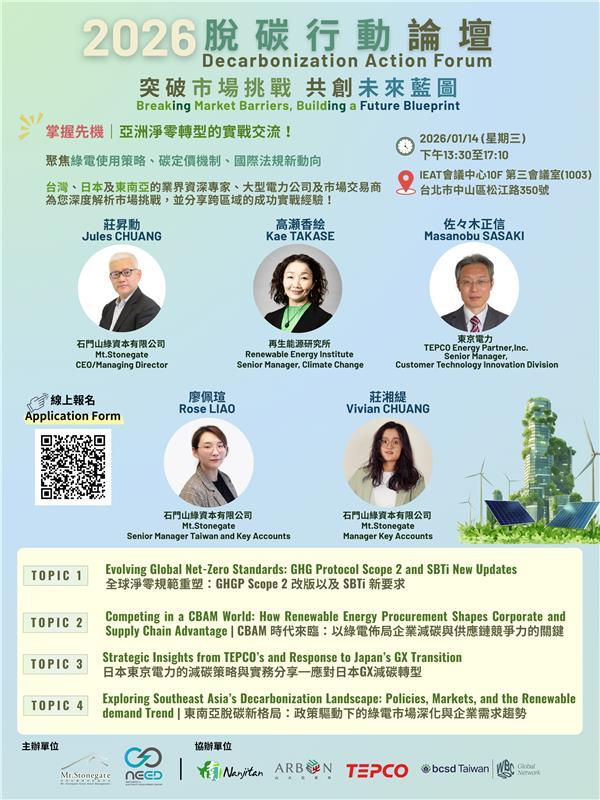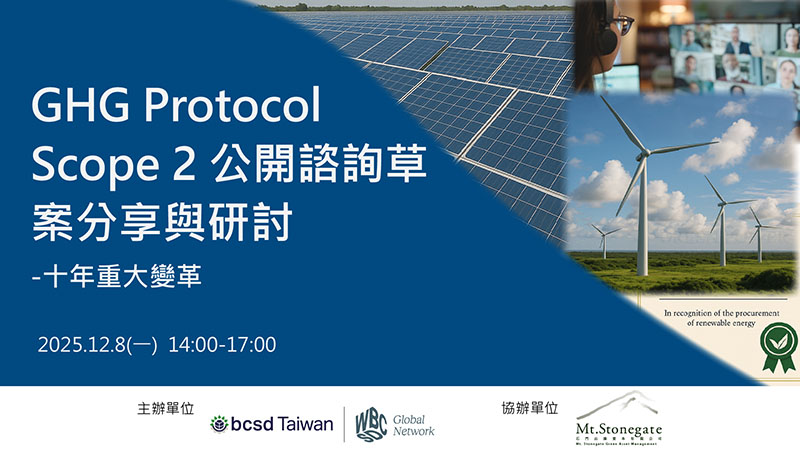CDx Summit 2025: Building Readiness for Credible Decarbonization Action
- Oct 31, 2025
- 3 min read

The Southeast Asia Corporate Decarbonization Exchange (CDx), organized by Asia Clean Energy Partners, was held on October 1–2 in Bangkok, Thailand. Over the two-day event, more than 300 industry leaders, policymakers, and sustainability experts from across the region gathered to exchange insights and strategies. CDx served as a collaborative platform to accelerate corporate climate action, enabling companies and stakeholders to share knowledge, build partnerships, and advance Southeast Asia’s transition toward a net-zero economy.
Mt. Stonegate is proud to sponsoring the event, supporting the collective mission to advance corporate decarbonization across Southeast Asia and foster the inclusion of small and medium-sized enterprises (SMEs) in the transition. Representing the company, Managing Director Jules Chuang, Manager of Southeast Asia Markets and Global EACs Sourcing Albert Sutanto, Market Lead-Philippines George K. Kiongson, and Project Analyst Maurelitya P. Dayinta shared their insights and expertise throughout the event.
Key Takeaways from Mt. Stonegate’s Discussion Sessions
The Great Debate: Navigating AI’s Role in Decarbonizing Southeast Asia

The panel explored whether Artificial Intelligence (AI) will accelerate or hinder decarbonization efforts. The debate highlighted that AI can enhance efficiency in areas such as ESG reporting and GHG accounting by automating complex data processes and serving as a supportive tool in the decarbonization journey. However, human validation remains essential to ensure accuracy and accountability.
At the same time, the discussion highlighted several challenges that may arise from the rapid development of AI. As emphasized by our Managing Director, Jules Chuang, global capital and talent are increasingly directed toward AI infrastructure instead of renewable energy. The rising energy use from AI data centers also puts pressure on power grids, often forcing operators to rely on coal and gas plants to meet the extra demand. In addition, many AI innovations do not directly solve the main barriers to expanding renewable energy, such as policy issues, slow grid connections, and funding gaps, even though AI still has great potential to improve things like grid management and equipment maintenance.
2. Renewable Energy Procurements in Southeast Asia

During Masterclass 1C: Renewable Energy Procurement in Southeast Asia, Albert Sutanto, Manager of Southeast Asia Markets and Global EACs Sourcing, shared insights on different procurement mechanisms across six key markets—Indonesia, Thailand, the Philippines, Vietnam, Malaysia, and Singapore—supported by real case studies from the region. The discussion highlighted the increasing variety of renewable energy procurement options, which are becoming essential tools for reducing carbon footprints and ensuring long-term cost stability.
The case study session was especially lively, with participants showing strong interest in the technical aspects of how companies can decarbonize in specific markets such as Malaysia and Singapore. On the other hand, the discussion also explored the dynamics of supply and demand in the REC market and how these factors influence corporate procurement decision.

In addition, the topic continued in a more interactive World Café session hosted by our Project Analyst, Maurelitya P. Dayinta, where participants had open conversations about renewable energy procurement in a flexible setting. The discussion went beyond technical points, touching on real market experiences, corporate challenges, and collaborative ideas on how to make renewable energy procurement more practical and impactful more likely for corporation or end users.
3. Carbon Financing for Corporate Projects

In another session, George K. Kiongson, Market Lead for the Philippines, shared a case study from the company’s carbon project portfolio in Taiwan during Fishbowl Track 3B: Unlocking Carbon Finance for Corporate Projects. George discussed the financing aspects of carbon projects and emphasized that participation in the voluntary carbon market can bring long-term financial and environmental benefits, particularly for small-scale farmers.
She explained that while upfront costs remain a major challenge, having the right project developer is essential to help secure incentives, arrange bank financing, or connect projects with corporate buyers seeking verified environmental attributes. She concluded by highlighting that with strong collaboration and a well-structured business model such as revenue-sharing or offtake agreements, even small agricultural players can successfully access carbon finance. With the right partners and commitment, sustainability can become both a meaningful environmental contribution and a viable financial opportunity.
Mt. Stonegate is honored to take part in meaningful conversations that drive corporate decarbonization across Southeast Asia. We appreciate the opportunity to exchange ideas with industry leaders and partners who share the same vision for a sustainable future. Let’s keep working together to accelerate Southeast Asia’s transition toward a cleaner and more sustainable future!




Comments